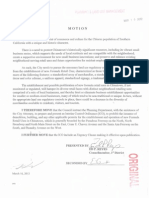Professional Documents
Culture Documents
Congressional Letter To Lagarde 070215-1
Uploaded by
Kathleen Miles100%(2)100% found this document useful (2 votes)
41K views3 pagesCongressional Letter to Lagarde 070215-1
Original Title
Congressional Letter to Lagarde 070215-1
Copyright
© © All Rights Reserved
Available Formats
PDF or read online from Scribd
Share this document
Did you find this document useful?
Is this content inappropriate?
Report this DocumentCongressional Letter to Lagarde 070215-1
Copyright:
© All Rights Reserved
Available Formats
Download as PDF or read online from Scribd
100%(2)100% found this document useful (2 votes)
41K views3 pagesCongressional Letter To Lagarde 070215-1
Uploaded by
Kathleen MilesCongressional Letter to Lagarde 070215-1
Copyright:
© All Rights Reserved
Available Formats
Download as PDF or read online from Scribd
You are on page 1of 3
Congress of the United States
Washington, BE 20515
July 2, 2015
Christine Lagarde
Managing Director
Intemational Monetary Fund
700 19th Street, NW
Washington, D.C. 20431
Dear Ms. Lagarde:
We are writing to you out of concem for the course of the current negotiations between the
government of Greece and European officials, of which the IMF is a major party. We are worried
that if the parties cannot reach an agreement, there is a risk of a serious financial erisis that
would not only seriously damage the Greek economy, but could also cause further harm to
Europe and the global economy.
The prolonged negotiations, as well as the restrictions on credit to the Greek government and
banking system as the European Central Bank tries to force more concessions from Greece, have
already pushed Greece back into recession and make its recovery more difficult with each
passing week.
We are particularly concerned with recent statements fom the IMF and European officials, as
well as press reports, indicating that the Fund is taking a hard line with respect to demands that
Greece implement further reforms. ‘The Greek people have already suffered through a very
painful adjustment over the past six years, losing more than a quarter of their national output, and
with 26 percent of their labor force and more than half of young workers falling into
unemployment.
This year, the economy was projected to grow by 2.5 percent, and recovery was to take hold. A
primary budget surplus of 3 percent of GDP was projected by the IMF. But the economic
turmoil caused by the standoff between the new Greek government and its creditors, including
the ECB’s restriction of liquidity at the same time that deposits were leaving the banking system,
has been a huge blow to the economy and to Greece's debt sustainability. The human costs of
the current severe cash crunch are also increasing: the New York Times reports: “The 140 or so
public hospitals in Greece received just €43 million from the state — down from €650 million
during the same period last year.”
Greece has already reduced its national public sector work force by 19 percent and carried out
‘many of the reforms demanded by the IMF and its creditors. It has gone through an enormous
fiscal adjustment, achieving the largest cyclically adjusted primary budget surplus in the euro
area last year, and a very large current account adjustment (with a 36 percent reduction in
imports). At the same time, as even the IMF has acknowledged in its own research, the austerity
imposed by Greece’s creditors over the past five years tumed out to be far more devastating to
the economy than they had predieted.
The IMF's insistence ~ stated last year in its Fifth Review of the current loan agreement — that
Greece run primary budget surpluses of more than 4 percent of GDP — for “many years to come,”
in order to pay off debt — is now widely recognized as a mistake. Greece needs a solution that
makes economic recovery a priority — otherwise it will continue falling back into the same trap
of austerity, recession, and increasingly unsustainable debt,
‘The Greek government has demonstrated its willingness to compromise, but as the IMF’s
European Director Poul Thomsen — who has been very much involved in the Greek bailout since
2010 — noted last month, there must be flexibility on both sides: “Clearly, the new government
has been elected with a strong public mandate to change the program, no doubt about that, and
no doubt that, of course, we fully accept this. As always, we will be flexible.”
As members of the U.S. Congress, we must also note the unprecedented difficulty that the IMF’s
proposed quota and governance reform has faced in the U.S. Congress since 2010. As you know,
this also has global implications, as some governments in developing countries have begun to
lose confidence in this effort to make the IMF’s voting structure more representative of its
member countries in the twenty-first century, and are seeking institutional alternatives. It will be
difficult to get a majority of the U.S. Congress on board for these important reforms if the IMF is
seen as responsible for further damage to the Greek economy, as well as the currently
unforeseeable consequences of any financial collapse.
We urge you to show the promised flexibility as soon as possible, in order to avoid a default
situation or other unintended consequences.
Sincerely,
Lf clametne—
Berard Sanders
United States Senator
Alan Grayson
Member of Congress
john Conyers, Jr.
Member of Congress ‘Member of Congress
Kei Ly on C. “Hg” Johnson, Jr.
Member of Congress Member of Congress
Tefisthakowsky
Member of Congress
Rosa DeLauro
‘Member of Congress Member of Congress
You might also like
- Chico-Blue Press ReleaseDocument1 pageChico-Blue Press ReleaseKathleen MilesNo ratings yet
- Rosby Complaint, Filed March 2013Document20 pagesRosby Complaint, Filed March 2013Kathleen MilesNo ratings yet
- Dirty Bomb Scenario Excerpt April 23Document2 pagesDirty Bomb Scenario Excerpt April 23Kathleen MilesNo ratings yet
- City Council Chinatown Formula Retail Motion 3-16-12Document1 pageCity Council Chinatown Formula Retail Motion 3-16-12Kathleen MilesNo ratings yet
- The Subtle Art of Not Giving a F*ck: A Counterintuitive Approach to Living a Good LifeFrom EverandThe Subtle Art of Not Giving a F*ck: A Counterintuitive Approach to Living a Good LifeRating: 4 out of 5 stars4/5 (5784)
- The Little Book of Hygge: Danish Secrets to Happy LivingFrom EverandThe Little Book of Hygge: Danish Secrets to Happy LivingRating: 3.5 out of 5 stars3.5/5 (399)
- Hidden Figures: The American Dream and the Untold Story of the Black Women Mathematicians Who Helped Win the Space RaceFrom EverandHidden Figures: The American Dream and the Untold Story of the Black Women Mathematicians Who Helped Win the Space RaceRating: 4 out of 5 stars4/5 (890)
- Shoe Dog: A Memoir by the Creator of NikeFrom EverandShoe Dog: A Memoir by the Creator of NikeRating: 4.5 out of 5 stars4.5/5 (537)
- Grit: The Power of Passion and PerseveranceFrom EverandGrit: The Power of Passion and PerseveranceRating: 4 out of 5 stars4/5 (587)
- Elon Musk: Tesla, SpaceX, and the Quest for a Fantastic FutureFrom EverandElon Musk: Tesla, SpaceX, and the Quest for a Fantastic FutureRating: 4.5 out of 5 stars4.5/5 (474)
- The Yellow House: A Memoir (2019 National Book Award Winner)From EverandThe Yellow House: A Memoir (2019 National Book Award Winner)Rating: 4 out of 5 stars4/5 (98)
- Team of Rivals: The Political Genius of Abraham LincolnFrom EverandTeam of Rivals: The Political Genius of Abraham LincolnRating: 4.5 out of 5 stars4.5/5 (234)
- Never Split the Difference: Negotiating As If Your Life Depended On ItFrom EverandNever Split the Difference: Negotiating As If Your Life Depended On ItRating: 4.5 out of 5 stars4.5/5 (838)
- The Emperor of All Maladies: A Biography of CancerFrom EverandThe Emperor of All Maladies: A Biography of CancerRating: 4.5 out of 5 stars4.5/5 (271)
- A Heartbreaking Work Of Staggering Genius: A Memoir Based on a True StoryFrom EverandA Heartbreaking Work Of Staggering Genius: A Memoir Based on a True StoryRating: 3.5 out of 5 stars3.5/5 (231)
- Devil in the Grove: Thurgood Marshall, the Groveland Boys, and the Dawn of a New AmericaFrom EverandDevil in the Grove: Thurgood Marshall, the Groveland Boys, and the Dawn of a New AmericaRating: 4.5 out of 5 stars4.5/5 (265)
- The Hard Thing About Hard Things: Building a Business When There Are No Easy AnswersFrom EverandThe Hard Thing About Hard Things: Building a Business When There Are No Easy AnswersRating: 4.5 out of 5 stars4.5/5 (344)
- On Fire: The (Burning) Case for a Green New DealFrom EverandOn Fire: The (Burning) Case for a Green New DealRating: 4 out of 5 stars4/5 (72)
- The World Is Flat 3.0: A Brief History of the Twenty-first CenturyFrom EverandThe World Is Flat 3.0: A Brief History of the Twenty-first CenturyRating: 3.5 out of 5 stars3.5/5 (2219)
- The Unwinding: An Inner History of the New AmericaFrom EverandThe Unwinding: An Inner History of the New AmericaRating: 4 out of 5 stars4/5 (45)
- The Gifts of Imperfection: Let Go of Who You Think You're Supposed to Be and Embrace Who You AreFrom EverandThe Gifts of Imperfection: Let Go of Who You Think You're Supposed to Be and Embrace Who You AreRating: 4 out of 5 stars4/5 (1090)
- The Sympathizer: A Novel (Pulitzer Prize for Fiction)From EverandThe Sympathizer: A Novel (Pulitzer Prize for Fiction)Rating: 4.5 out of 5 stars4.5/5 (119)
- Her Body and Other Parties: StoriesFrom EverandHer Body and Other Parties: StoriesRating: 4 out of 5 stars4/5 (821)












































